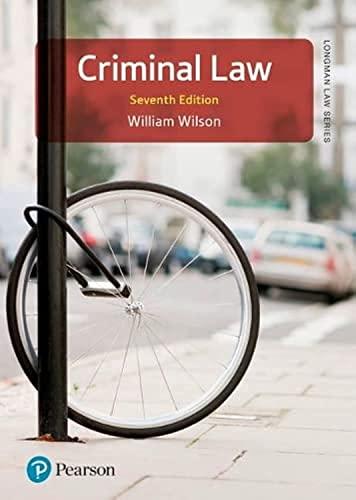Question
Law 101, To guide in determining the areas of law that may regulate the use of smart sensing devices, could you please explain: a) The
Law 101,
- To guide in determining the areas of law that may regulate the use of smart sensing devices, could you please explain:
a) The difference, using relevant examples, between public and private law
b) Whether 'Ethical Design Principles' developed for the smart technology industry by a team of engineers, social scientists and lawyers, could be considered 'law'?
2. HoS is located in the State of New South Wales (NSW) and provides its manufactured products to organisations throughout Australia. In light of this, could you please explain:
a) Whether, and on what basis, we should examine both State and Commonwealth legislation
b) What might happen in the event of inconsistency between State and Commonwealth legislation?
3. Given that these smart sensing devices collect personal data, we anticipate that the Data Privacy Act 1998 (Cth) ('Act') will be relevant to our inquiry and that we should also be aware of the functions of the regulator- the Australian Data Privacy Commissioner ('ADPC'). As such, could you please describe:
a) The steps involved in locating a copy of this Act
b) The nature of the powers and functions that regulatory bodies, such as the ADPC, might have as part of the executive arm of government?
4. Recently, a company in United States (US) that manufactures devices similar to those provided by HoS was sued for engaging in 'unfair practices'. We think it is important to explore whether similar lawsuits have occurred in Australia. To provide further context to this inquiry, could you please explain:
a) The nature of case law and the role of judges in the Australian legal system
b) The circumstances in which a case is considered to form a blinding precedent, commenting on whether the US decision described above would be considered relevant to Australia law
5. One of the concerns that HoS has raised with us is the uncertainty surrounding whether biometric data collected by identity-based building access systems is considered 'sensitive data' under 10 of the Date Privacy Act 1998 (Cth) ('Act'). It seems as though this type of data does not fall squarely within the definition provided by the Act and therefore some interpretation is required. To this end, could you please
a) Explain the general approach that a Court would take to the statutory interpretation of 'sensitive data'
b) Identify the Court/ that may have already decided cases involving the interpretation of the Act.
6. Lastly, one of the key goals of HoS is to design adaptive smart devices that enhance compliance with frequently changing COVID- safety requirements. It is our understanding that such requirements are able to change at a rapid pace because they are found within delegated legislation, usually made by individual Ministers. However, we are unsure what this means in practical terms, so could you please:
a) Explain the similarities and differences between legislation and delegated legislation
b) Discuss the extent to which you think the practice of delegating legislative power is consistent with the notion of liberal democracy
Step by Step Solution
There are 3 Steps involved in it
Step: 1

Get Instant Access to Expert-Tailored Solutions
See step-by-step solutions with expert insights and AI powered tools for academic success
Step: 2

Step: 3

Ace Your Homework with AI
Get the answers you need in no time with our AI-driven, step-by-step assistance
Get Started


